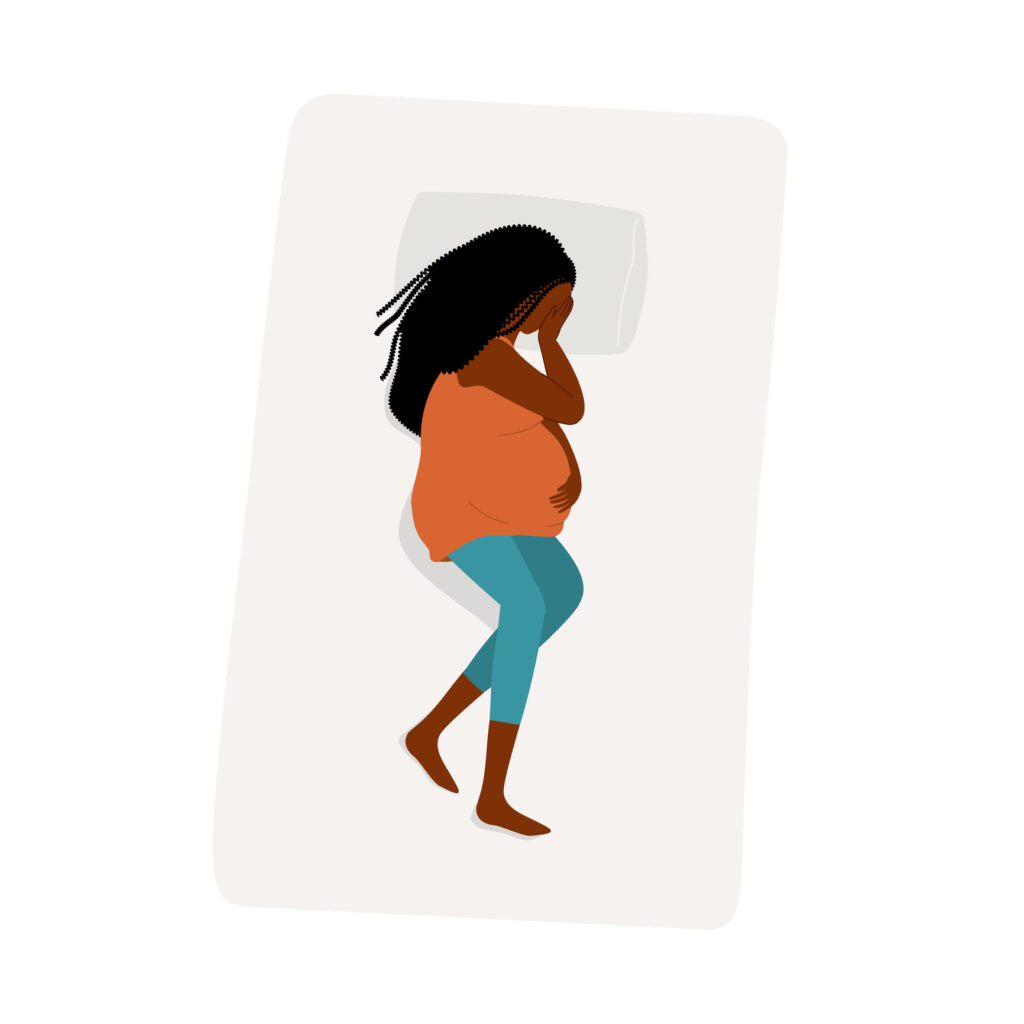Coping With Anxiety During Pregnancy For A Healthy Mind And Baby

It’s completely normal to experience some anxiety during pregnancy. Your body is changing, and the thought of becoming a new parent can feel worrying. You’re not alone in how you think. But if you’re anxious a lot of the time and struggle to relax, it could be time to ask for help and find ways to cope with anxiety to support a healthy mind and baby. In this article, we talk about the impact of anxiety on pregnancy and ways you can manage anxiety.
The Impact Of Anxiety On Pregnancy and Baby
While many healthcare providers warn about the signs of postpartum depression after having a baby, you can also experience anxiety during pregnancy and after birth. Anxiety during pregnancy is called antenatal anxiety, and it can affect both parents. Any caregiver can experience constant worry about the well-being of their children also; this is referred to as parental anxiety.
Symptoms of anxiety during pregnancy include:
- Dizziness
- Rapid heartbeat
- Constant worry
- Muscle tension
- Difficulty sleeping
- Loss of appetite
- Grinding teeth
- Headaches
- Restlessness
Having a baby can be a very happy occasion and, at the same time, overwhelming. Specific challenges of pregnancy can contribute to anxiety, including fatigue, sleep difficulties, hormonal changes, and previous miscarriages. You might worry about the extra financial pressure that comes with having a child, the delivery, or your baby’s health. It’s perfectly natural to worry about these things during pregnancy. However, when that worry becomes too much, it could have an impact on both the mother and the baby.
Research suggests that anxiety during pregnancy can increase the chances of a lower birthweight, preterm birth, earlier gestational age, and smaller head circumference. Prenatal stress can also increase your blood pressure.
5 Practical Strategies For Managing Anxiety During Pregnancy
Anxiety can become a cycle as the more anxious you feel, often the harder it is to sleep, which in turn, can make you feel more anxious. If you are feeling anxious during your pregnancy, it’s easy to get stuck in a loop of worry and its impact on your baby; instead, try to focus on getting help and finding ways to manage how you feel. Although it can be stressful, remember you are doing everything possible to look after your baby.
- Seek Support: Join Support Groups Or Find Professional Help
Although it can feel tough, try not to be too hard on yourself or feel guilty. Talk about how you feel to your friends, family, midwife, and doctor. You will likely hear how other people are going through similar things, and it can make you not feel so alone. Emotional support from friends and family can be beneficial during tough times.
If you find yourself struggling, also consider asking for professional support. Speaking to a therapist or joining a support group can help you to make sense of how you’re feeling, and with a therapist, you can start to figure out how to cope and manage anxiety during pregnancy. Support groups can help expecting parents find a group of like-minded individuals going through the same milestones. Being in a judgment-free zone with people who have firsthand experience can make you feel listened to and validated.
Therapies for anxiety include cognitive behavioral therapy, which focuses on challenging negative thoughts and emotions and developing coping methods. Medication may be a consideration if anxiety is severely impacting your daily function. But this is a personal discussion to have with your doctor or psychiatrist, who knows your mental health and medical background extremely well.
- Maintain A Healthy Lifestyle: Regular Exercise And Balanced Diet
A healthy diet can give your body the nutrients it needs for you and the baby, while regular exercise supports a strong body. The American College of Obstetricians and Gynecologists (ACOG) recommends that, ideally, those pregnant should get 150 minutes of moderate-intensity aerobic activity every week. Of course, discussing your exercise routine with your ob-gyn in early prenatal visits is still important.
A balanced diet and regular exercise are essential for anyone, pregnant or not. Regular physical activity that you have discussed with your doctor can help to manage anxiety. Exercise is a good outlet for stress and to release endorphins. A nutritious diet gives your body the fuel to maintain energy levels.
- Practice Relaxation Techniques: Deep Breathing Exercises And Meditation
Deep breathing exercises are helpful for relaxing and coping with anxiety. Become aware of your breathing and try to breathe deeply from your diaphragm through your nose. Deep and controlled breathing can help to slow the heartbeat and stabilize blood pressure. Meditation, gentle yoga, stretching, and muscle relaxation can also help you to relax and find time for yourself.
- Understand Triggers: Identifying Situations That Trigger Anxiety
During pregnancy, people can start to develop worries and fears around elements like childbirth and needles or blood tests. It’s important to recognize the signs of anxiety during pregnancy so that you can speak to a therapist, doctor, or midwife. You will not be judged or criticized for how you feel, but the more they know about your mental health, the better they can offer the right treatment plan.
Understanding and identifying anxiety triggers can help you learn to develop healthy coping methods. Learning to analyze what makes you feel a certain way can be helpful in managing anxiety.
- Prioritize Self-Care: Taking Time For Yourself To Relax
Try to prioritize self-care during pregnancy and take time for yourself to relax. Creating a routine with healthy habits supports the well-being of both you and the baby. Self-care can help manage stress during pregnancy and find a positive outlet for dealing with all the emotions that come with pregnancy. Ideas for self-care during pregnancy include:
- Drink lots of water
- Eat a colorful and varied diet
- Get a good night’s sleep
- Go for a walk in nature
- Develop a pregnancy support system
The Role Of Communication With Healthcare Providers
It’s crucial to have open communication with your healthcare provider about any mental health concerns you have. Talking to a doctor about anxiety during pregnancy can feel daunting, but it’s crucial for developing the right treatment plan. Your doctor or midwife may refer you to a mental health professional who can help address your concerns.
Prioritizing Mental Health For A Healthy Pregnancy
It’s crucial to prioritize your mental health during pregnancy. This can look different depending on the individual. It could be taking time for yourself each day, developing a support system, or finding positive outlets to de-stress.
By understanding the signs to look out for, you, your partner, or a loved one can recognize anxiety during pregnancy and take the necessary steps to ask for help. While pregnancy can be a joyous occasion, it can be overwhelming, emotional, and challenging.
If you think you would benefit from therapy for anxiety during pregnancy or any other mental health concerns, book an appointment online or call the office to get the help you need. We have offices in most major cities, including LA, Miami, NYC, and Boston.

Understanding Impostor Syndrome: Breaking Free from Self-Doubt
Imposter syndrome can make you feel like a fraud with no confidence in your abilities. You’re not alone; so many people feel like this. The good news is that you can break free from imposter syndrome and overcome self-doubt; here’s how.

Supporting a Loved One with Mental Illness: Practical Tips and Resources
There isn’t one perfect way to support a loved one with mental illness. How you care for someone will depend on you and the person you support. Mental illness can affect all aspects of a person, from mood to behavior. It can come as a shock when a loved one is diagnosed with a mental illness.

Is My Relationship One-Sided?
Do you feel like you’re doing all the work in a relationship? When a relationship is one-sided, it can create stress and conflict. If one partner invests more energy and effort to make the relationship work, it creates an imbalanced dynamic that can be draining in the long haul.

How To Recover From Burnout?
Manageable and short-term stress can increase alertness and give you the focus to hit a tight deadline. But left unchecked, chronic stress can result in burnout, leading to complete physical, mental, and emotional exhaustion.
